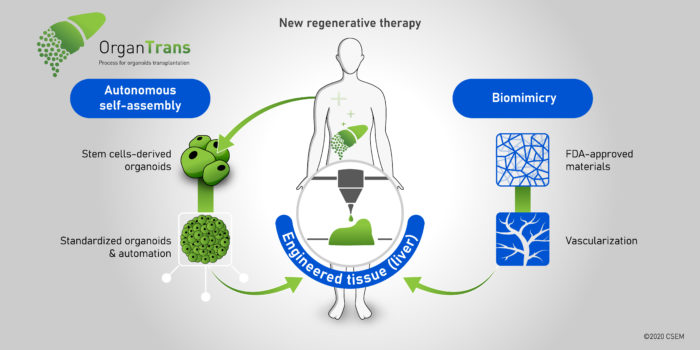First press release: ORGANTRANS Regenerative medicine breakthrough
European consortium to develop an automated and standardized tissue engineering platform capable of generating a liver construct
Neuchatel, January 5, 2020: European (EU) H2020 funded ORGANTRANS project is set to develop a disruptive solution that enables the 3D printing of tissue-engineered constructs. Coordinated by CSEM, eight consortium members will create a standardized and automated tissue preparation and maturation platform, which will provide patients with End-Stage Liver Disease (ESLD) an alternative to donor organ transplants.
Organoids, so called microtissues, are radically transforming personalized medicine, thanks to their unique therapeutic potential in disease modeling, drug testing and organ replacement. The ORGANTRANS project will capitalize on advancements in the regenerative medicine field, to develop an entire value chain that will supply the regulated tools to engineer a complex liver construct that is safe to undergo clinical translation.
Organoid solution: the building blocks behind personalized liver tissues
There is an indicative need for innovative alternatives to organ donations, and organoids are part of this solution. Under this project’s objectives, patients suffering from ESLD who still have residual healthy liver tissue, will be eligible to have adult stem cells collected, isolated, self-organized into organoids, assembled by printing, and then matured in a first-of-its-kind combination bioreactor.
“The consortium’s expertise is such that we can combine different environments in the platform that are needed for biomimicry and autonomous self-assembly (organoids) ̶ the two essential elements necessary for bioengineering of a healthy and safe liver construct” enthuses Gilles Weder from CSEM, Project Coordinator, “successfully combining all these two environments, and then providing the necessary development and testing infrastructure, biomanufacturing and commercializing the outputs and performance validation with an end-user point of view is to the best of our knowledge completely unique.”
Replicating an organ as complex as the liver is not without its difficulties, and patient safety is of paramount importance. Aside from creating an alternative to organ donation, an additional key benefit of the ORGANTRANS project is its personalized aspect. By replicating the patient’s own stem cells to construct the liver the chance of organ rejection is mitigated.
Project Manager, Martina Nesverova form Amires, is further keen to emphasize that throughout all ORGANTRANS‘ developmental phases “medical device specifications and regulations will be stringently met, and managed with the support of Kugelmeiers AG, as well as the end-users ̶ three leading European transplant centers who form the External Advisory Board (including consortium member Kings College London).”

The ORGANTRANS platform uniquely combines both environments needed to successfully achieve autonomous self-assembly and biomimicry. Organoids formed by self-assembling stem cells replicate embryonic development to produce discrete units that self-organize to create mini-organs (organoids – the building blocks). Biomimicry enables the replication of a tissue’s architecture (the scaffolding), that supports elements such as the vascular network.
CSEM’s established and broad expertise in the life sciences, drug testing, and regenerative medicine domains makes them an ideal candidate to coordinate the transformation of science into groundbreaking solutions for human health. “In this context, we have a strong emphasis on developing Deep Tech, which supports the complete valorization chain ̶ from cell source to organ-on-chip systems or engineered tissues” remarks Gilles Weder, “forging strong relations between the members of this consortium, and further developing long-standing relations, such as our partnership with RegenHu (bioprinting) and Kugelmeiers, only serves to strengthen Swiss SME’s innovative capacities at a European level.”
ORGANTRANS will capitalize on technology first developed in Europe, and by establishing a platform that produces tissue engineered autologous livers for patients in personalized, time-sensitive manner is a huge milestone ̶ one that will place Europe at the forefront of Regenerative Medicine. Even though the project’s aim is liver repair, it has scope to be translated in the future to repair or heal of other tissues, like the pancreas or heart.
The full press release can be downloaded HERE.